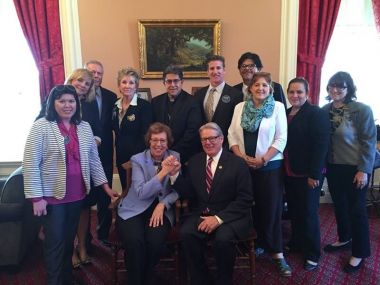California Senate passes controversial doctor-assisted death bill

The California Senate has passed a highly controversial doctor-assisted death bill, a legislation that is opposed by various pro-life groups.
Senate Bill 128 was passed on Thursday with a 23-15 vote and has already been transmitted to the California State Assembly for deliberation.
The bill, called the End of Life Option Act, will legalize a terminally-ill adult patient's request to end his life by taking a drug.
Under the bill, a California resident may request to receive a prescription for an aid-in-dying drug if he has a terminal disease and only has six months to live. The request will be granted if he voluntarily expressed the wish to get the said drug.
The individual has to submit two oral requests 15 days apart and a written request to his attending physician.
It also frees an individual from any civil, criminal, administrative, employment or contractual liability for participating in good faith in the procedure, including being present when the qualified individual self-administers the aid-in-dying drug.
"Nothing in this part may be construed to authorize a physician or any other person to end an individual's life by lethal injection, mercy killing, or active euthanasia. Actions taken in accordance with this part shall not, for any purposes, constitute suicide, assisted suicide, homicide, or elder abuse under the law," according to the bill.
The bill is closely modelled after Oregon's Death With Dignity Act.
Groups including the California Family Alliance (CFA) are opposing the bill.
The CFA said SB 128 violates a doctor's Hippocratic Oath to "do no harm" and "ignores the subjective and unreliable practice of estimating a person's life expectancy after receiving a terminal diagnosis."
The California Medical Association (CMA) dropped its opposition to the bill last month, becoming the first state medical association to change its position on the issue of physician aid in dying.
The CMA said it has adopted a neutral stance on the matter. "As physicians, we want to provide the best care possible for our patients. However, despite the remarkable medical breakthroughs we've made and the world-class hospice or palliative care we can provide, it isn't always enough," said Dr. Luther Cobb, CMA president.
He said the participation in the End of Life Option Act "is a very personal one between a doctor and their patient, which is why CMA has removed policy that outright objects to physicians aiding terminally ill patients in end of life options."
"We believe it is up to the individual physician and their patient to decide voluntarily whether the End of Life Option Act is something in which they want to engage. Protecting that physician-patient relationship is essential," he said.
Meanwhile, California Senator Lois Wolk hailed what she called the "historic shift" that the medical community has taken on the issue. Wolk is one of the authors of SB 128.
The fate of the bill in the California Assembly or with California Gov. Jerry Brown remains uncertain.











